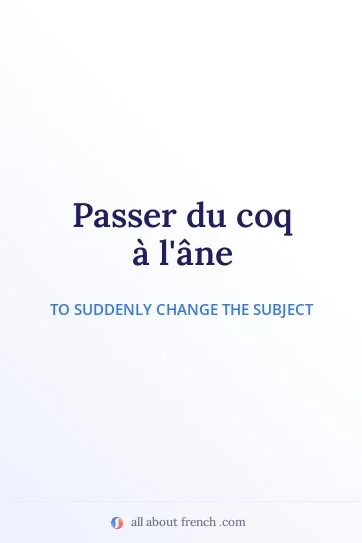
We are going to explain you all the things you ever wanted to know about the funny French expression "Passer du coq à l'âne". This include a complete definition of what it is and how to use it in a conversation with an audio example.In addition, we also added useful stuff like dialogue example, slow pronunciation audio, synonym and more!
Translation : To suddenly change the subject
Literal meaning : To move from the rooster to the donkey
Register : Informal - Funny
Slow
Normal
IPA : / pase dy kɔk‿ a lan /

All right, this one won't be easy to explain, brace yourself.
During the 14th century, French people used the expression "Saillir du coq à l'asne" (To copulate from the rooster to the duck). Because it happens sometimes that a rooster tries to copulate with ducks...
With time, people started to use this weird interracial fact as a comparison for people abruptly changing subject. Arguing that it's as illogical as a rooster trying to "boom boom" a duck.
So, they said: "Passer du coq à l'asne" (To go from the rooster to the duck) to represent someone going from one subject to another completely unrelated one.
But wait, where is the donkey coming from?
First: "Asne" (Old word for "duck") and " ne" (Donkey) are pronounced exactly the same. Secondly, "Asne" is not used anymore (it's now "Canard") while " ne" is still used.
Then, as a result for people using it for centuries: "Passer du coq à l'asne" slowly turned into "Passer du coq à l'âne" into people's minds. Even if the donkey has nothing to do with this expression...
You are in the middle of a passionate debate, when the person you are talking with suddenly starts talking about the weather, out of nowhere...
You can say: "Wtf?" but also "Tu passes du coq à l'âne !" (You go from the rooster to the donkey!). If the person is doing that frequently, you can even say: "Arrête de passer du coq à l'âne !" (Stop going from the rooster to the donkey!).
We have an expression to make fun of this expression (Yes it's crazy...).
It's "Passer du Coca Light", which means absolutely nothing (literally: "to go from light coke") but sounds extremely similar to the original expression and with a sweet (but light) pun.
Sauter du coq à l'âne. ("To jump from the rooster to the donkey")
↓ Example in a story with translation ↓
Finally, let's see an example in a parallel story with slow audio.
Une soirée avec une amie
An evening with a friend
10%
The story just started!
Get full access to 365 texts and quizzes, including this one.
 Discover more
Discover more Already a member? Full story and quiz here.
